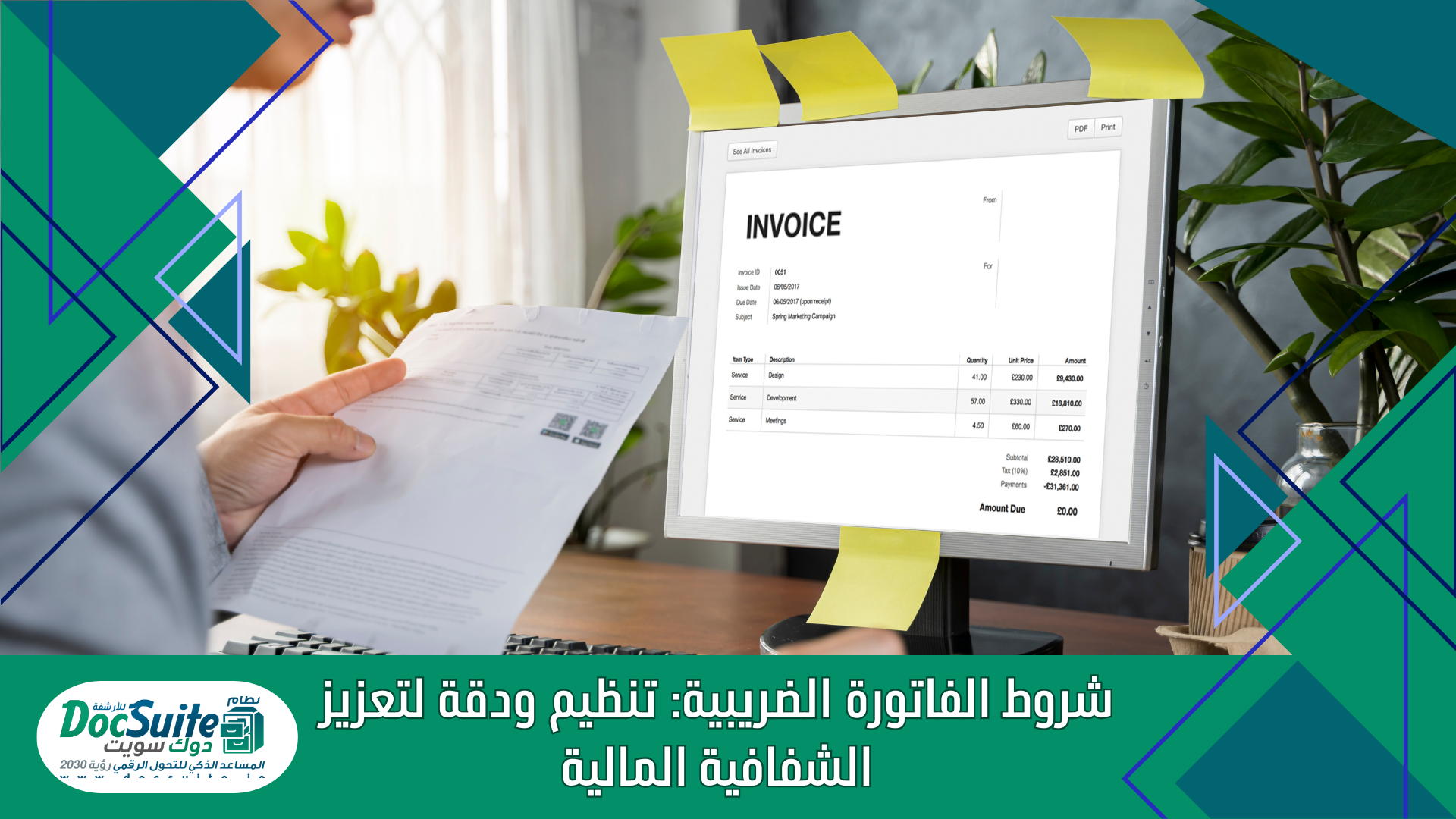فهرس الموضوع
Tax Invoice Terms: Organization and Accuracy to Enhance Financial Transparency
In light of the digital transformation witnessed by the Kingdom of Saudi Arabia, the tax invoice has become an essential part of the financial system, as it is a vital tool to ensure transparency and accuracy of business operations. These invoices require compliance with a set of necessary conditions. In this context, the role of the DocSuite system comes as an innovative tool that effectively contributes to facilitating compliance with these conditions. With the modern technologies that DocSuite relies on, institutions can transform their management from the traditional paper system to an integrated electronic environment, which ensures that tax invoices are documented accurately and flexibly.
Continue reading the article to learn more information.
MWhat is the tax invoice?
A tax invoice is an essential element in business transactions, as it represents a means of documenting purchases and sales between suppliers and customers and ensuring compliance with tax regulations. However, to achieve maximum legal and accounting compliance, there are a set of conditions that tax invoices must meet, which aim to provide transparency and accurate documentation of business transactions.
Achieving this commitment requires a great deal of effort in document management and process organization, which can be easily achieved using advanced tools such as DocSuite, which provides a technical solution that contributes to converting paper work into electronic work, ensuring compliance with conditions with great flexibility and simplicity. DocSuite relies on artificial intelligence and cybersecurity technologies to ensure a high level of efficiency and speed, in line with the Kingdom’s Vision 2030.
Tax invoice terms
There are many conditions for a tax invoice, the most important of which are the following:
- The necessity of clarifying the basic tax invoice data
The basic data in the tax invoice is one of the most important conditions to ensure its acceptance by the tax authorities, as the invoice must contain the name and address of the supplier, his commercial registration number and his tax number, in addition to the data of the consumer or buyer, which includes his name and address.
These details are essential to ensure the validity and accuracy of business transactions, and provide a means of auditing and financial transparency. This is where DocSuite comes in as a smart document management solution, providing a simplified mechanism for entering and organizing essential data efficiently, allowing users to enter and save information in a way that ensures accuracy.
Moreover, the system enables tracking these invoices and referring to them when needed with ease. In fact, the use of tools such as DocSuite is considered part of the development of the business system towards comprehensive electronic management, as it contributes to facilitating the implementation of tax requirements and enhancing control over basic data in an effective and secure manner, which helps institutions enhance their efficiency and reduce the risks of non-compliance with regulations.
- The importance of specifying the release date and details of the products or services
The tax invoice also requires the accurate date of issuance of the invoice, as this date is a basic reference when reviewing invoices by tax authorities, and constitutes evidence of the date of execution of the transaction. In addition, the details of the products or services provided must be clarified in the tax invoice, so that it includes a description of the product, the number of units, the unit price, and the total price before and after adding the value-added tax.
These requirements ensure transparency and provide an accurate picture of transaction details. DocSuite helps organizations document these details in an organized and smooth manner. The system converts transactions into smart electronic forms that organizations can easily manage and review. Thanks to the automation technology provided by DocSuite, it becomes easy to adjust recurring details such as history and basic product details, making this process faster and more accurate, and enhancing the confidence of the parties concerned in accounting reports. DocSuite relies on modern technologies that ensure complete protection of this data using cybersecurity tools, which achieves great compatibility with regulatory requirements and contributes to achieving business goals effectively and completely safely.
- Include VAT and total amount
The addition of the value added tax is considered one of the necessary elements that must be present in the tax invoice, so that it is clearly detailed next to the total final amount that must be paid. This information must be clear and accurate, as it allows accounting authorities to track tax obligations in an easy and organized manner, which is a prerequisite for full compliance.
DocSuite comes to provide a practical solution for organizations that wish to comply with these requirements through flexible systems that support the automatic and detailed entry of tax values, which reduces human errors and provides more accuracy. With DocSuite, organizations can ensure that the tax is calculated and documented in each invoice with ease, thanks to the technologies that the system relies on, which combine artificial intelligence and automation to achieve these goals with high flexibility.
Managing these tax processes is part of companies’ responsibility towards transparency in financial transactions, a responsibility supported by DocSuite by providing a platform that helps track tax obligations and ensure compliance, which contributes to improving administrative processes and is an investment in a transparent and sustainable financial environment in line with the Kingdom’s Vision 2030.
- Clarity of payment method and tax invoice number
Accounting regulations require that the method of payment be specified on the tax invoice, stating whether the payment was made in cash, by credit card, or by other electronic payment methods. This requirement helps regulatory authorities track financial collections and enhances transparency. A unique invoice number must also be included for each transaction, as this number is used to accurately track the transaction in accounting records.
Here comes DocSuite to play an important role in providing an electronic system that can generate a unique invoice number and record the payment method in a smooth and integrated manner. DocSuite relies on fully automating accounting processes, providing companies with an effective and easy way to document each business transaction, and allowing easy and flexible data retrieval.
This powerful tool not only helps in achieving financial compliance but also enhances the performance of daily operations, which contributes to saving time and effort and increasing efficiency. DocSuite can be considered a long-term investment for entrepreneurs and organizations seeking to innovate in managing their operations. It is a tool that helps enhance environmental sustainability by reducing reliance on paper. This development reflects the Kingdom’s Vision 2030 towards complete digital transformation.
Tax invoice requirements are not just rules imposed by regulatory bodies, but rather standards that aim to ensure accuracy and transparency in business operations. DocSuite is an innovative technical tool that provides integrated solutions that meet these requirements, making it an ideal choice for organizations wishing to transform to electronic management in line with the Kingdom’s future vision, and enhance the effectiveness of their daily operations through a flexible, secure, and sustainable system.

The role of DocSuite in achieving the requirements of the tax invoice
DocSuite is considered one of the advanced digital solutions that contribute significantly to facilitating companies and institutions’ compliance with the terms of the tax invoice, which enhances the accuracy of business operations and ensures compliance with tax regulations. The role of this system is to provide an integrated electronic environment based on automating administrative procedures and documents, which contributes to achieving the conditions stipulated by the tax regulations for tax invoices. Below we review the most prominent roles of DocSuite in achieving these conditions:
Convert paper invoices to electronic invoices
DocSuite provides companies with the ability to create a tax invoice electronically according to the standards and requirements set by the General Authority of Zakat and Income in the Kingdom of Saudi Arabia. This electronic tax invoice includes all the basic data that a tax invoice must contain, such as the name of the seller and buyer, tax registration number, description of the products or services, the total amount, and the value-added tax. Thanks to this electronic transformation, human errors that may occur in paper invoices are reduced, which enhances the accuracy of calculations and compliance with tax laws.
Integration with electronic payment and billing systems
By integrating the system with electronic payment systems, DocSuite provides a flexible platform that allows the tax invoice to be automatically exported to the government tax system. This integration facilitates the process of submitting tax returns periodically, as all information related to invoices is included in terms of value and contents, ensuring that the conditions of the tax invoice are correctly applied.
Automate procedures and facilitate follow-up and auditing
DocSuite is characterized by its ability to automate all steps of issuing and following up on tax invoices, ensuring that all issued invoices are continuously monitored and audited. The tax invoice is stored electronically in the system, which facilitates the process of referring to it at any time quickly and flexibly, and provides tools to audit the tax invoice and ensure that it contains all required data such as the invoice number, date of issue, and value-added tax.
Full compliance with cybersecurity and data protection
Data protection is a top priority for any system that deals with sensitive information such as tax invoices. DocSuite relies on advanced cybersecurity technologies to ensure the protection of all data related to invoices. Data stored and transferred is securely encrypted, ensuring that corporate information is protected from any breach or leakage. The system also adheres to the latest security standards to ensure compliance with local and international laws and regulations related to data protection.
Providing analytical and accurate reports
DocSuite allows organizations to generate accurate analytical reports containing tax invoice details, which helps in evaluating financial performance and ensuring that companies comply with all tax standards. These reports can help facilitate tax audits by the competent authorities, as it is easy to refer to the tax invoice and know the exact details of each business transaction.
Automatic update of tax standards
One of the features of DocSuite is that it provides automatic updates to changing tax laws and regulations. In the event of any changes in tax regulations or tax invoice terms, the system automatically updates its settings, ensuring that businesses are always compliant with the latest standards without the need for manual intervention.
With these smart features and functions, it can be said that DocSuite plays a vital role in enabling businesses to meet tax invoice requirements effectively and accurately, and ensures their compliance with all local tax laws. The system also helps transform complex traditional procedures into smoother and more efficient processes, which enhances productivity and reduces the risks associated with human errors or legal violations.
